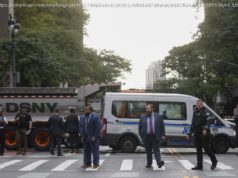Here’s what you need to know to start your day.
(Want to get this briefing by email? Here’s the sign-up .)
Good morning. South Korea’s ruling on military service, the saga of the missing Thai soccer team, and remembering an Aboriginal Australian woman. Here’s what you need to know:
• President Trump’s trade threats are taking their toll on China’s economy.
The main Chinese stock market is down more than 20 percent since January, making it a bear market, and the currency is down more than 5 percent from its peak in February.
If investors didn’t have enough to worry about: An internal government analysis that was widely circulated on social media this week said that “in China there is currently a high probability of financial panic” because of the looming trade dispute.
The turmoil comes as the U. S. defense secretary, Jim Mattis, visited the region to shore up alliances. Mr. Mattis met with his counterpart in Seoul, South Korea, on Thursday, above, to reaffirm Washington’s commitment to thwarting North Korea’s nuclear ambitions.
And the White House said the first formal summit meeting between Mr. Trump and President Vladimir Putin of Russia is scheduled to take place in Helsinki, Finland, on July 16.
_____
• Australia passed its most significant counterintelligence overhaul since the 1970s .
The new legislation bans foreign interference in politics and criminalizes those who damage Australia’s economic relations with another country. “It’s a big deal,” one expert said. “It modernizes our intelligence laws at a time when the government’s saying that the spying threat is extremely high.”
Australia is especially anxious about Chinese power. The new laws are similar to — but more far-reaching than — those passed in Britain and the U. S. after 9/11.
_____
• South Korea’s border with the North is one of the most heavily armed in the world. All eligible South Korean men are currently required to serve for 21 to 24 months in the military. (North Korean men typically serve for a decade.)
But in a landmark decision, South Korea’s Constitutional Court ruled that the government must provide civilian forms of service to conscientious objectors. The South has prosecuted more young men for conscientious objection — almost all of them Jehovah’s Witnesses — than any other country, with up to three years in prison for those who refuse to serve.
_____
• Thailand’s search continues.
The saga of the missing youth soccer team grew more urgent and complex on its sixth day, as a rescue team considered drilling through a mountaintop to reach the flooded cave.
The search for the boys, ages 11 to 16, and their coach has captivated Thailand and drawn the attention of King Maha Vajiralongkorn. There was some hope: The governor of Chiang Rai Province said that the search operation was making good progress.
“We hope that we will find them soon,” he said. “I am not saying ‘soon’ as in days but rather ‘soon’ as in hours.”
_____
• The announcement of Justice Anthony Kennedy’s retirement delivered a powerful jolt to the U. S. at a fragile time.
The political war over replacing him was already started. Here’s what we can expect in the coming months.
The Supreme Court this week also overturned Korematsu v. U. S., the 1944 ruling that upheld the internment of Japanese-Americans during World War II. For many survivors, including the actor George Takei, above, the decision felt like a hollow victory.
“It’s an insult to people who spent their lives fighting,” he said.
• Apple and Samsung settled a closely watched, seven-year legal battle over smartphone patents . “And if I had to characterize it,” one observer said, “it didn’t really accomplish anything.”
• Amazon said it will buy PillPack, an online pharmacy, sending anxiety through the U. S. drug business. Shares of Walgreens and Rite Aid dropped more than 10 percent on the news, and CVS Health dropped 9 percent.
• “L’affaire Lafarge.” The French cement giant Lafarge SA is under formal investigation over allegations that it financed terrorist groups, including the Islamic State, in Syria.
• Snapped up: Facebook bought Instagram for $1 billion in 2012. It’s now been valued at 100 times that price.
• China put limits on movie stars’ salaries in a bid to stop “money worship” and tax evasion in the entertainment industry.
• U. S. stocks were up. Here’s a snapshot of global markets.
• In Mumbai, a chartered plane crashed into a construction site, killing all four people onboard and at least one pedestrian. [ The New York Times]
• Multiple gunshots were fired at a newspaper in Annapolis, Md. Check back for more updates. [ The New York Times]
• A man wielding a kitchen knife killed two boys outside an elementary school in Shanghai. [ The New York Times]
• China and Russia are pushing to eliminate human rights jobs from United Nations peacekeeping missions. The move comes as the U. S. presses for the U. N. to lower spending. [ The New York Times]
• The “Witness K” affair: A former Australian spy who exposed an intelligence operation in East Timor and his lawyer are facing criminal prosecution. [ ABC]
• Climate change could sharply diminish living conditions for up to 800 million people in South Asia, a new study warned. [ The New York Times]
• The paradox of Europe’s migration crisis: “The actual number of arriving migrants is back to its pre-2015 level, even as the politics of migration continue to shake the Continent,” our correspondent writes. [ The New York Times]
• The British Museum accepted a donation of hundreds of rare Chinese ivory carvings despite a growing backlash and a coming ban. [ The New York Times]
• From the World Cup: Japan advanced to the second round despite losing to Poland, 1-0. South Korea is out, but its defeat of Germany won the team hordes of Mexican fans. “Korean, brother, you are Mexican now,” many chanted as they rallied at the South’s embassy in Mexico City. [ The New York Times]
Tips, both new and old, for a more fulfilling life.
• How to plan the perfect trip with your significant other .
• How airline stopover programs can work for you .
• Recipe of the day: Want to tackle a project this weekend? A strawberry Pavlova is a worthy and delicious challenge.
• In memoriam. Daisy Kadibil, 95, an Aboriginal Australian who trekked hundreds of miles across the Outback to return home after the government forcibly separated her from her parents when she was a girl. The treacherous journey inspired a film, “Rabbit-Proof Fence.”
• They said #MeToo and shared their stories. But as the movement grew, what became of those who stepped forward? Ashley Judd, Gwyneth Paltrow and 18 others reveal what happened afterward.
• And Mao 101: This dispatch from Beijing goes inside a Chinese classroom that is training future Communist leaders. “We’ve learned democracy just can’t last long here,” one student said.






